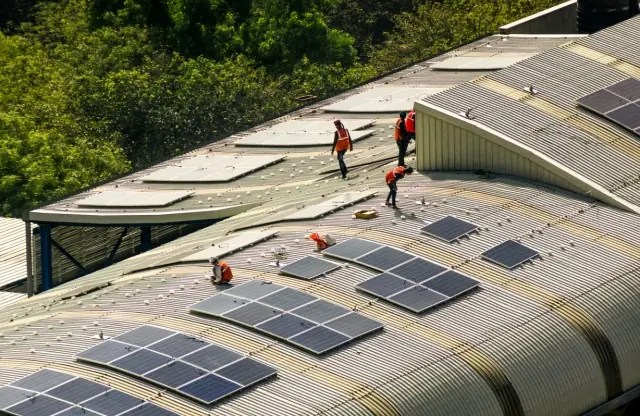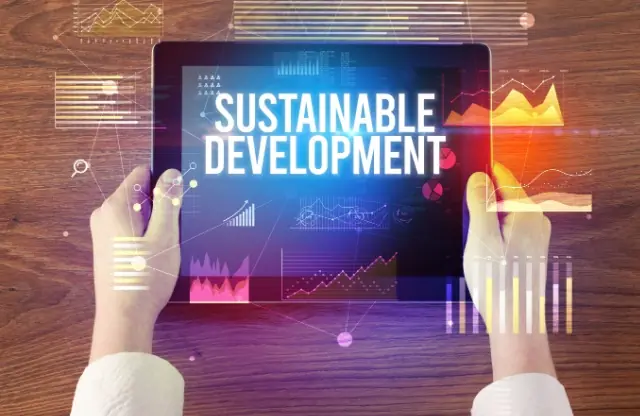
Measuring India’s Growth on the Sustainability Development Index
 Share
Share
 Copy Url
Copy Url

The Sustainable Development Index is a crucial tool in measuring a country's progress toward achieving sustainable development goals. By incorporating key metrics like the UN SDGs and per capita performance, the Index plays a significant role in evaluating the economy and sustainability reporting. As part of the 2030 Agenda for Sustainable Development, nations strive to implement strategies that promote sustainability. The Index offers a clear picture of their progress toward these ambitious targets.
In this article, we'll explore the core components of the Sustainable Development Index and India's position on it. We'll delve into India's journey toward sustainable development and examine the road ahead. Additionally, we'll navigate the path of sustainable development and highlight the role of the Sustainable Development Index in sustainability reporting. Join us as we uncover these essential topics and more.
What is the Sustainable Development Index?
The Sustainable Development Index (SDI) measures how well countries are developing in an eco-friendly way. It updates the old Human Development Index (HDI) to fit our current environmental needs. The SDI looks at each nation's scores in life expectancy, education, and income. Then, it adjusts these scores based on how much they impact the environment. This means it checks their per capita CO2 emissions and material use. Countries that grow without harming the planet score higher.
The SDI is important for tracking progress toward the 17 sustainable development goals (UN SDGs) set by the United Nations. It provides a detailed view of a country's progress by focusing on both human development and ecological sustainability. This aligns with the 2030 agenda to promote global sustainability. The SDI also highlights the need for sustainability reporting, helping countries to plan and monitor their progress. It shows that balancing economic growth with environmental care is essential for sustainable development in the Anthropocene era.
Tracking Progress in the Anthropocene
As our understanding of human development evolves, so too must our metrics for tracking it. The concept of "human development in the Anthropocene" highlights the interplay between human progress and ecological limits. The SDI addresses this by integrating ecological efficiency into its assessment framework. Traditional indices often overlook the environmental impact of development, leading to unsustainable practices. By incorporating ecological factors, the SDI provides a more holistic view, encouraging countries to pursue sustainable development goals responsibly. This shift is essential as we move toward implementing the 2030 agenda and achieving the UN SDGs.
Core Components of the Sustainable Development Index
The Sustainable Development Index (SDI) measures how well countries achieve human development goals while staying within ecological limits. This section explains the main parts of the SDI: the Human Development Index, the Ecological Footprint, and Inequality Adjustment.
Human Development Index
The Human Development Index (HDI) forms the base of the Sustainable Development Index. The HDI evaluates a country's progress by considering life expectancy, education levels, and income. These factors give an overall picture of human well-being. In the SDI, this basic HDI score is the starting point. It assesses how well countries provide a good quality of life to their citizens.
Ecological Footprint
The next critical component of the SDI is the Ecological Footprint. The Ecological Footprint measures the environmental impact of human activities. It focuses on CO2 emissions and material footprint. The SDI adjusts the HDI score by checking how much a country's emissions and material use exceed fair shares of planetary boundaries. Countries with high human development and low ecological impact rank higher. This method helps move toward sustainability by encouraging countries to grow without harming the environment.
Inequality Adjustment
The SDI also adjusts for inequality, ensuring that development is fair and inclusive. It factors in the demographic spread of income, education, and life expectancy. By considering inequality, the SDI promotes balanced growth, ensuring that all segments of the population benefit from development efforts. This change is essential to reflect a true picture of a country's progress toward the sustainable development goals.
Where does India rank on the Sustainable Development Index?
India's performance on the Sustainable Development Index (SDI) reflects both progress and ongoing challenges. This section explores India's ranking, achievements, and areas needing improvement as it works toward sustainability.
India's Ranking on the Sustainable Development Index
In the latest Sustainable Development Report, India ranks 112th out of 166 countries in terms of progress toward the Sustainable Development Goals (SDG Index). This marks an improvement from its previous rank of 121st in 2022. Despite this progress, India still trails behind several South Asian countries like Bhutan, the Maldives, and Sri Lanka. India's score on the SDG Index is 63.45, indicating moderate progress, but highlighting significant areas for development.
Harmonizing Human Development and Ecological Impact
India's performance in the Sustainable Development Index shows a balance between human development and ecological impact. The SDI methodology includes adjustments for CO2 emissions and material footprint. India's efforts toward sustainability include using more renewable energy and promoting sustainable farming. Yet, India faces challenges like managing air and water pollution, and waste, and ensuring sustainable urban planning. These factors are key indicators in the footprint of nations, and India's performance in these areas will be important for future improvements.
Journeying Toward Sustainable Development
India's journey toward sustainable development shows significant progress and ongoing efforts to balance economic growth, social equity, and environmental protection. The Sustainable Development Index (SDI) measures these efforts, highlighting India's achievements and areas for improvement as it works toward sustainability.
Taking Action for Environmental Sustainability
India has implemented numerous initiatives to promote ecological responsibility. One key area is renewable energy. India is the third-largest producer of renewable energy, with 42% of its power coming from clean sources. It aims to reduce CO2 emissions and material footprint as part of its broader strategy. These indicators are crucial in the SDI calculation. The country has launched extensive tree-planting programs and measures to fight pollution. These actions help achieve India's environmental sustainability goals. They show India's commitment to reducing the ecological impact of development while working toward a sustainable future for current and future generations.
Promoting Human Well-being
In terms of social sustainability, India has made significant progress in healthcare, education, and gender equality. Social welfare programs play a crucial role in improving these areas. For example, India's national health programs and educational initiatives aim to ensure that development benefits everyone. These efforts are essential for creating a more fair and inclusive society, aligning with the broader SDG Index goals. Despite these advancements, challenges remain in reducing inequalities and improving urban sustainability. Addressing these issues is vital for India's continued progress on the Sustainable Development Index.
The Road Ahead for India
Challenges and Opportunities
India has made great progress on the Sustainable Development Index. However, it still faces big challenges. One major issue is managing the country's ecological footprint during rapid development and population growth. Balancing economic growth with protecting the environment is a tough job. It needs new ideas and ongoing effort.
But these challenges also create new opportunities. They push for new solutions like clean energy technologies and sustainable urban development. These innovations can help India grow its economy in a way that is fair and good for the environment. So, even though India's journey on the Sustainable Development Index is difficult, it offers a chance to improve how we develop.
Charting the Course for Sustainable Development
Navigating the path of sustainable development is challenging. Especially for a diverse and populous nation like India. The Sustainable Development Index (SDI) serves as a comprehensive guide, helping to check progress and shape policy decisions. As India advances on this journey, it must balance economic growth with environmental stewardship and social equity. Every step is crucial in building a sustainable future.
India's journey on the Sustainable Development Index is ongoing. While there are challenges, the country's commitment to sustainable development offers a transformative opportunity to redefine progress for the better. This journey, though difficult, promises a sustainable future worth striving for.
The Role of the Sustainable Development Index in Sustainability Reporting
The Sustainable Development Index (SDI) is very important for sustainability reporting. It gives a comprehensive assessment of how well a country is doing in meeting sustainable development goals. The SDI helps nations and companies track their progress in environmental, social, and economic areas.
Sustainability reporting means sharing information about economic activities and their effects on the environment and society. The SDI uses different indicators to measure this impact, like resource efficiency and CO2 emissions. By looking at these factors, the SDI shows both the positive and negative impacts of economic growth on natural resources and social well-being.
A key feature of the SDI is its ability to link different sustainability metrics. This provides a full picture of a nation's progress. It looks at how well countries manage their natural resources and their efforts toward sustainability. For example, it encourages practices that reduce ecological footprints while promoting economic growth.
Connecting the SDI to Corporate Responsibility
The SDI is not only a tool for governments but also for corporations. Companies can use the SDI to guide their sustainability reporting efforts. When businesses align their strategies with the SDI, they can better understand their role in national and global sustainability goals. This alignment is crucial for corporate responsibility. It helps companies find areas to improve their environmental and social impact.
Driving Impact with Sustainability Reporting
Sustainability reporting, guided by the SDI, drives companies and governments toward sustainability. The SDI ensures transparency and accountability by showing how economic activities affect the environment and society. Regularly reporting these impacts helps organizations make informed decisions. These decisions promote resource efficiency and sustainable development. This practice supports the larger goal of achieving a sustainable future for current and future generations.
In summary, the Sustainable Development Index serves as a vital tool in sustainability reporting. It helps assess the overall progress of countries and corporations toward sustainable development. By using the SDI, organizations can better understand their impact, improve their practices, and contribute positively to global sustainability efforts.
Contact Report Yak for Premium Sustainability Reporting
India's progress on the Sustainable Development Index (SDI) reflects its ongoing efforts to balance economic growth, social equity, and environmental sustainability. While significant challenges remain, such as managing the ecological footprint amidst rapid development and population growth, these challenges also present unique opportunities. Innovations in clean energy and sustainable urban development can drive inclusive economic growth and environmental protection.
At Report Yak, we understand the complexities of the Sustainable Development Index and how to effectively integrate it into your sustainability reports. Our expertise in sustainability practices and report design allows us to create reports that meet regulatory standards and inspire action. We tailor each report to showcase your business's unique sustainability efforts, utilizing the SDI to accurately depict your environmental, social, and economic impacts.
At Report Yak, we believe in the power of sustainability and strive to be more than just a report design agency. Our team is your dedicated partner, committed to guiding you on your path toward sustainable growth. By working with Report Yak, you ensure that your sustainability reports not only comply with regulations but also drive meaningful change. Our team has collaborated with large organizations in India and across the world to create impactful annual, sustainability, impact, and ESG reports.
For more information, visit the Showcase page on the Report Yak website. For a full list of services, please see our Services page. Get in touch with us for any queries at 1800 121 5955 (India), email us at contact@reportyak.com, or reach out via WhatsApp or our Contact Form.
General Information Sources
Sustainable Development Report 2023
Sources for India-related Information
Related Posts
-
Understanding Greenwashing: Truth Behind Eco-Friendly Claims
Environmental sustainabilityESG
+7
Jul 3, 2024Share
Copy Url
Putting The Focus On Sustainability In The Aviation Industry
environmental and social initiativesEnvironmental sustainability
+7
Jun 14, 2024Share
Copy Url
Important ESG Reporting Trends for 2024: What You Need to Know
Annual Report designcorporate reporting
+6
Jun 13, 2024Share
Copy Url








